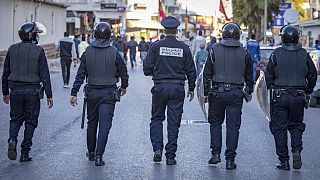Ramadan
Muslims gathered along a street-long table to break their Ramadan fast together in a mass "Iftar" meal on the 15th day of the Muslim holy month, in the Matariya suburb in the northeast of Egypt's capital Cairo.
The wonderful scene brought together thousands of Muslims and Christians as the event is held in the middle of the Ramadan fasting period.
The organizers believe the event is meant to bring unity among people from different backgrounds ranging from nationalities and religions.
"The idea of the (Iftar) table isn't only to eat and drink, the idea is 3,000 people are sharing the same table with the same religion and nationality and are eating together at the same time," said Ihab El-Shah- at, an event organizer.
Around 6,000 people within the neighborhood participate in this colorful event full of decorations. Neighboring communities also do attend to enjoy the food and the atmosphere.
"The table isn't specified for specific people, it is for everyone, all the neighbors and their children are participating, anyone passing the street can join the table," said a resident.
Health authorities had initially directed the governors to apply the precautionary and preventive measures for the Coronavirus (COVID-19) to preserve the safety and health of citizens during the holy month of Ramadan.
After a two-Ramadan hiatus due to Covid-19, Cairo began receiving requests of holding Mawaid el-Rahman, or charity iftars, this Ramadan. -
"The Coronavirus has stopped us from attending (Iftar table) every year, many people used to come here from different areas to break the fast, not only this (Iftar) table but also to any other (Iftar) table," a resident said.
Big tables that have different types of foods are offered for free for anyone to join at the call of Maghrib prayer, announcing the time for Muslims to break their fasting. The guests are usually the poor or people who did not go home in time.











01:30
Brazilian president slams Trump for threatening 50% tariffs
02:20
France: Avignon Festival celebrates Egyptian diva Umm Kulthum
01:42
Gaza conflict overshadows EU-Southern Neighbourhood talks in Brussels
Go to video
Gaza’s scarcity of cash fuels desperation, sparks unusual trade
01:08
Dancehall superstar Shatta Wale urges young people to back President Mahama
01:53
SMES under pressure as business confidence hits four-year low in South Africa